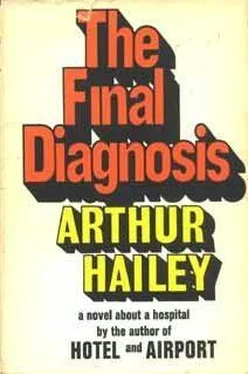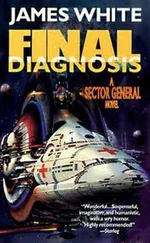Arthur Hailey - The Final Diagnosis
Здесь есть возможность читать онлайн «Arthur Hailey - The Final Diagnosis» весь текст электронной книги совершенно бесплатно (целиком полную версию без сокращений). В некоторых случаях можно слушать аудио, скачать через торрент в формате fb2 и присутствует краткое содержание. Жанр: Триллер, на английском языке. Описание произведения, (предисловие) а так же отзывы посетителей доступны на портале библиотеки ЛибКат.
- Название:The Final Diagnosis
- Автор:
- Жанр:
- Год:неизвестен
- ISBN:нет данных
- Рейтинг книги:4 / 5. Голосов: 1
-
Избранное:Добавить в избранное
- Отзывы:
-
Ваша оценка:
- 80
- 1
- 2
- 3
- 4
- 5
The Final Diagnosis: краткое содержание, описание и аннотация
Предлагаем к чтению аннотацию, описание, краткое содержание или предисловие (зависит от того, что написал сам автор книги «The Final Diagnosis»). Если вы не нашли необходимую информацию о книге — напишите в комментариях, мы постараемся отыскать её.
The Final Diagnosis — читать онлайн бесплатно полную книгу (весь текст) целиком
Ниже представлен текст книги, разбитый по страницам. Система сохранения места последней прочитанной страницы, позволяет с удобством читать онлайн бесплатно книгу «The Final Diagnosis», без необходимости каждый раз заново искать на чём Вы остановились. Поставьте закладку, и сможете в любой момент перейти на страницу, на которой закончили чтение.
Интервал:
Закладка:
From the second floor Mike Seddons used the stairway to reach Pathology. He entered the autopsy room and in the annex found David Coleman dissecting a leg. Seddons looked at the limb and saw it white and lifeless, the dark blood seeping out from Coleman’s knife cuts. For an instant of horror he pictured it nylon-sheathed, a high-heeled sandal upon the foot. Then, with an awful fascination, he crossed the room and read the name in the open case file.
When he had done so, Mike Seddons went into the corridor and vomited against the wall.
“Oh, Dr. Coleman! Do come in.”
Kent O’Donnell got up courteously from his office desk as the young pathologist entered the room. David Coleman had been cleaning up after the dissection when the message from the chief of surgery had reached him.
“Sit down, won’t you?” O’Donnell held out an engraved gold case. “Cigarette?”
“Thank you.” Coleman took a cigarette and accepted the light O’Donnell offered. He leaned back, relaxed, in one of the leather armchairs. An instinct told him that what was to follow would be a turning point in his life.
O’Donnell moved behind the desk to the office window. He stood with his back to it, the morning sun behind him. “I imagine you’ve heard,” he said, “that Dr. Pearson has resigned.”
“Yes, I’d heard.” Coleman answered quietly, then to his own surprise he heard himself saying, “You know, of course, these past few days he hasn’t spared himself. He’s been here day and night.”
“Yes, I know.” O’Donnell regarded the glowing tip of his cigarette. “But it doesn’t change anything. You realize that?”
Coleman knew that the chief of surgery was right. “No,” he said, “I don’t suppose it does.”
“Joe has expressed a wish to leave at once,” O’Donnell continued. “It means there will be an immediate vacancy here for a director of pathology. Shall you accept?”
For a second David Coleman hesitated. This was the thing he had coveted—a department of his own; freedom to reorganize, to mobilize the new aids of science, to practice good medicine, and to make pathology count as he knew it truly could. This was the cup he had sought. Kent O’Donnell had lifted it to his lips.
Then fear struck him. Suddenly he was appalled at the awesome responsibility he would have to hold. It occurred to him there would be no one senior to relieve him of decisions; the ultimate choice—the final diagnosis—would be his alone. Could he face it? Was he yet ready? He was still young; if he chose, he could continue as a second-in-command for several years more. After that there would be other openings—plenty of time to move ahead. Then he knew that there was no escaping, that this moment had been moving toward him since his own first arrival at Three Counties Hospital.
“Yes,” he said. “If it’s offered to me, I shall accept.”
“I can tell you that it will be offered.” O’Donnell smiled. He asked, “Would you tell me something?”
“If I can.”
The chief of surgery paused. In his mind he was choosing the right phrases for the question he wanted to put. He sensed that what was to be said next would be important to them both. Finally he asked, “Will you tell me what your attitude is—to medicine and to this hospital?”
“It’s hard to put into words,” Coleman said.
“Will you try?”
David Coleman considered. It was true there were things he believed, but even to himself he had seldom expressed them. Now, perhaps, was a time for definition.
“I suppose the real thing,” he said slowly, “is that all of us—physicians, the hospital, medical technology—exist only for one thing: for patients, for healing of the sick. I believe we forget this sometimes. I think we become absorbed in medicine, science, better hospitals; and we forget that all these things have only one reason for existence—people. People who need us, who come to medicine for help.” He stopped. “I’ve put it clumsily.”
“No,” O’Donnell said. “You’ve put it very well.” He had a sense of triumph and of hope. Instinct had not belied him; he had chosen well. He foresaw that the two of them—as chief of surgery and director of pathology—would be good together. They would go on and build and, with them, Three Counties would progress. Not all that they wrought would be perfect; it never was. There would be flaws and failures, but at least their aims were the same, their feelings shared. They would have to remain close; Coleman was younger than himself, and there were areas in which O’Donnell’s greater experience could be of help. In these past few weeks the chief of surgery himself had learned a good deal. He had learned that zeal could lead to complacency as surely as indifference, and that disaster could be reached by many routes. But from now on he would fight complacency on every front, and Pathology, with young Dr. Coleman at its head, could be a stout right arm.
A thought occurred to him. He asked, “One more thing. How do you feel about Joe Pearson and the way he’s leaving?”
“I’m not sure,” David Coleman said. “I’ve been wishing I knew.”
“It’s not such a bad thing to be unsure sometimes. It takes us away from rigid thinking.” O’Donnell smiled. “There are some things I think you should know though. I’ve been talking with some of the older men on staff; they’ve told me incidents, things I didn’t know about.” He paused. “Joe Pearson has done a great deal for this hospital in thirty-two years—things that are mostly forgotten now or that people like you and me don’t always get to hear about. He started the blood bank, you know. It’s strange to think of it, but there was a lot of opposition at the time. Then he worked for the formation of a tissue committee; I’m told a good many staff men fought him bitterly on that. But he got the committee and it did a lot to raise the standard of surgery here. Joe did some investigative work, too—on the cause and incidence of thyroid cancer. Most of it’s generally accepted now, but few people remember that it came from Joe Pearson.”
“I didn’t know,” Coleman said. “Thank you for telling me.”
“Well, these things get forgotten. Joe brought a lot of new things into the lab, too—new tests, new equipment. Unfortunately there came a time when he didn’t do new things any more. He let himself vegetate and get in a rut. It happens sometimes.”
Suddenly Coleman thought of his own father, his strong suspicion that the sensitized blood which killed the Alexanders’ child had stemmed from a transfusion his father had given years before—given without Rh typing, even though the dangers were already known to medicine.
“Yes,” he said. “I suppose it does.”
Both men had risen and moved to the door. As they went out O’Donnell said softly, “It’s a good thing for all of us to have compassion. You see, you never know whether someday you’ll need it yourself.”
Lucy Grainger said, “Kent, you look tired.”
It was early afternoon, and O’Donnell had paused in a main-floor corridor. Unnoticed, she had stopped beside him.
Dear Lucy, he thought—unchanged, warm and tender. Was it really less than a week ago that he had considered leaving Burlington and marrying Denise? At the moment it all seemed far away—a nostalgic interlude that now was nothing more. Here was where he belonged; in this place, for good or ill, was where his destiny lay.
He took her arm. “Lucy,” he said, “let’s meet soon. There’s a lot we have to talk about.”
“All right.” She smiled with affection. “You may take me to dinner tomorrow.”
Side by side, they moved on down the hallway, and it was somehow reassuring to have her beside him. He glanced sideways at her profile, and there came to him a sense of certainty that for both of them there was much that was good ahead. Perhaps it would take time to adjust, but in the end he knew they would find their future together.
Читать дальшеИнтервал:
Закладка:
Похожие книги на «The Final Diagnosis»
Представляем Вашему вниманию похожие книги на «The Final Diagnosis» списком для выбора. Мы отобрали схожую по названию и смыслу литературу в надежде предоставить читателям больше вариантов отыскать новые, интересные, ещё непрочитанные произведения.
Обсуждение, отзывы о книге «The Final Diagnosis» и просто собственные мнения читателей. Оставьте ваши комментарии, напишите, что Вы думаете о произведении, его смысле или главных героях. Укажите что конкретно понравилось, а что нет, и почему Вы так считаете.












